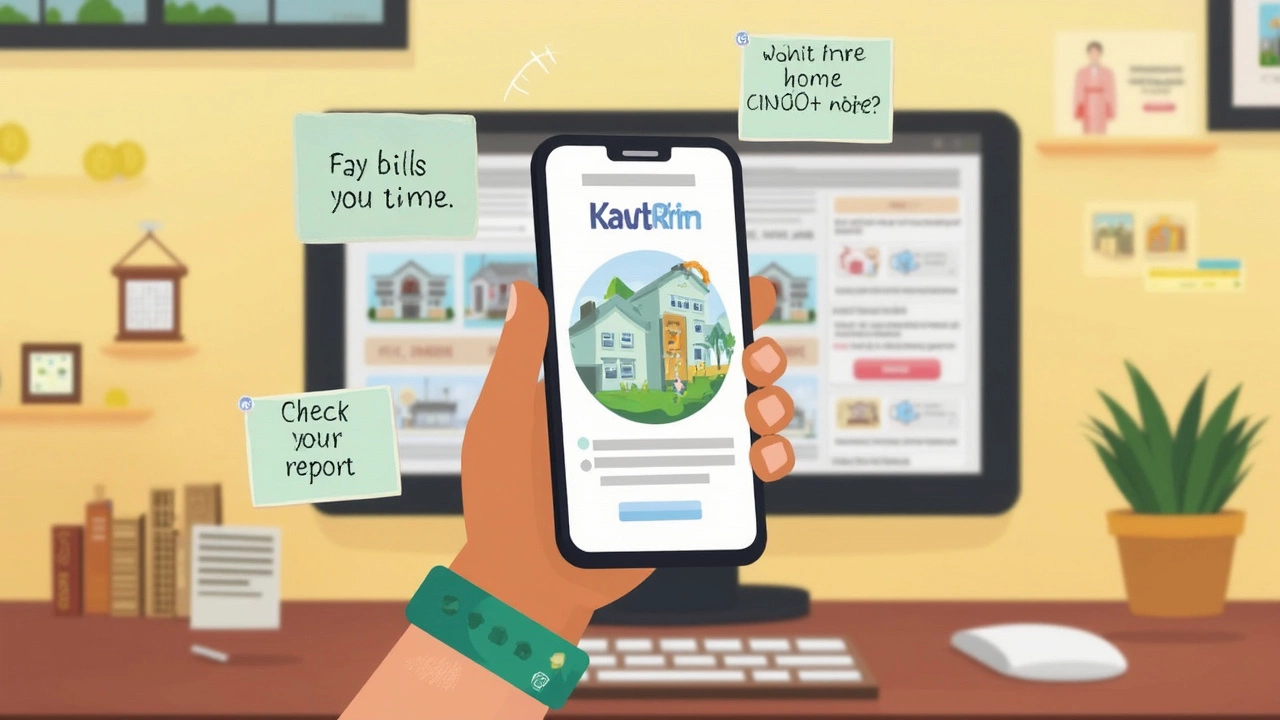Ready to buy a house? Your credit score isn’t just a number—it’s the key that opens (or closes) doors. Most lenders won’t even glance at your application if your score’s too low. But what’s the magic number?
For most people, you need at least a 620 credit score to have a shot at a standard mortgage. Some government-backed loans, like FHA loans, will look at scores as low as 580—some even dip to 500, but with way more strings attached. It’s not just about getting approved, either. Higher scores often mean way better rates and smaller monthly payments.
I remember when Neela and I bought our first place online. Even with steady jobs, the bank cared way more about Bruno’s credit score than his appetite. (Kidding—if dogs could get mortgages, Bruno would live in a castle by now.)
If you’re eyeing your dream home, check your credit early. Spot any errors on your report and handle them fast. The difference between a 619 and a 620—just one point—could decide whether that email from the seller is an approval or a rejection.
- Why Credit Scores Matter for Homebuyers
- Minimum Scores for Popular Loan Types
- How Your Credit Score Impacts Mortgage Rates
- Ways to Improve Your Score Before Buying
- Mistakes to Avoid When House Hunting Online
Why Credit Scores Matter for Homebuyers
If you’re looking to buy a house, your credit score is the first thing lenders check. It’s really their way of judging how likely you are to pay them back. Banks want to see you’re good for the money before they risk handing over hundreds of thousands of dollars.
When you apply for a mortgage, the lender pulls your score from the major credit bureaus—usually Experian, Equifax, and TransUnion. They don’t care much about your Spotify playlist, but they’re obsessed with your credit habits: Do you pay bills on time? Do you max out credit cards? Have you missed payments? All of that gets rolled into this number.
- Credit score affects whether you even get approved for a mortgage in the first place.
- A higher score unlocks better interest rates, which can save you tens of thousands of bucks over the life of the loan.
- Low or “iffy” scores can mean bigger down payments, stricter rules, or straight-up denials.
Check out this simple breakdown—a lower score could cost you a lot more in the long run:
| Credit Score Range | Typical Interest Rate | $300,000 Loan: Est. Monthly Payment |
|---|---|---|
| 760+ | 6.1% | $1,817 |
| 700-759 | 6.3% | $1,850 |
| 620-699 | 7.1% | $2,012 |
| Below 620 | 7.8% or higher (often denied) | $2,165 (if approved) |
Small changes in your credit score can shift your monthly payment by hundreds of dollars. Picture that money going to Netflix or dog treats for Bruno instead of extra bank fees. That’s why smart buyers try to boost their scores before getting serious about house shopping online. Lenders notice the difference, and you’ll notice it in your budget.
Minimum Scores for Popular Loan Types
Not all home loans are built the same, and the credit score you need depends a lot on the loan you go after. Lenders use set benchmarks—if you hit the number, you’ve got a chance. Miss it, and you’re out of the game for now.
Let’s break down the main types you’ll see when you decide to buy a house online:
- Conventional loan: You need at least a 620 credit score. This one’s pretty strict because private lenders back it, not the government. If your score’s much higher, say 740+, you’ll get the best interest rates.
- FHA loan: These are the friendliest for first-time buyers. The magic number here is 580 with a 3.5% down payment, but you can still qualify between 500 and 579 if you put down at least 10% up front. Most online lenders, though, really want to see you at 620+ for a smooth process.
- VA loan: This one's for veterans or active duty military. Officially, there’s no hard minimum, but in real life, most VA lenders want at least a 620. Some will dip to 580 if you’ve got strong finances elsewhere.
- USDA loan: If you’re buying in a rural area, you might use this option. The typical cutoff is 640, but every lender tweaks the rules a bit.
Check out these numbers side-by-side to get a quick sense of what you’re aiming for:
| Loan Type | Minimum Credit Score | Best Terms At |
|---|---|---|
| Conventional | 620 | 740+ |
| FHA | 580 (3.5% down), 500 (10% down) | 680+ |
| VA | 620 (typical) | 700+ |
| USDA | 640 | 700+ |
The big takeaway? If you want more mortgage approval options, boost your score now. Each point counts. In a lot of cases, just barely meeting the minimum gets you in, but hitting higher numbers brings lower rates and fewer headaches.

How Your Credit Score Impacts Mortgage Rates
Your credit score isn’t just about getting a yes or no from the bank. It actually plays a huge role in what your home loan really costs you every month. Basically, the higher your score, the lower your mortgage rate. Simple as that.
Here’s what’s wild: Even a 20-point difference in your FICO score can save you thousands—or cost you thousands—over the life of your loan. Lenders look at your score to decide how risky it would be to loan you money. If they see you as risky (aka low score), they crank up the interest to protect themselves.
Check out this table showing how scores affect rates for a typical 30-year fixed mortgage:
| Credit Score Range | Estimated Interest Rate (as of 2025) |
|---|---|
| 760-850 | 6.0% |
| 700-759 | 6.2% |
| 680-699 | 6.6% |
| 620-679 | 7.1% |
| Below 620 | Won't Qualify (or rates skyrocket) |
Say your loan is $300,000. If your score is 760, your monthly payment could be almost $200 less than if you barely qualify with a 620 score. Over 30 years, that’s over $70,000 saved, just from having a better score. That’s not pocket change.
Lenders also add something called “loan-level price adjustments” to your deal if your score falls in a lower band. It’s just a fancy way of saying you’ll pay a premium. This stuff stacks up quick: higher rates, higher closing costs, even higher insurance requirements sometimes.
The takeaway: boosting your credit score before applying for a mortgage almost always gives you a better deal. If you’re close to a bump-up (like from 695 to 700), even a small jump makes a noticeable difference on your rates. It’s worth working on your credit before you hit that “apply” button online.
Ways to Improve Your Score Before Buying
If your credit score isn’t quite where you want it, don’t panic. Most people can move their score up faster than they think, as long as they’re smart about it. Lenders check for patterns, so every step counts.
Here’s what actually works if you want to buy a house online and snag that loan:
- Check your credit report for errors. According to a 2023 Consumer Reports survey, 34% of people found at least one mistake when they checked. Even a small error can drop your score by dozens of points. Go through your reports from all three bureaus (Equifax, Experian, TransUnion) and dispute anything that’s wrong.
- Pay down your credit card balances. The sweet spot is using less than 30% of your total credit. If you have $10,000 in limits, try to keep your balance under $3,000. Lenders see this as a sign you’re not strapped for cash. Cutting card balances can boost your score in a matter of weeks.
- Don’t open new lines of credit right before applying for a mortgage. Every time you apply, your score takes a tiny hit. Too many new accounts at once can look desperate to lenders.
- Pay every bill on time, even the little ones. Late payments stick to your report for years, and being just 30 days late can tank your score by 60–100 points.
- Become an authorized user on someone else’s healthy account. This trick works if your spouse, sibling, or even a trusted friend has a solid credit history. Their good behavior can give your credit score a lift.
Wondering how much these steps could matter? Take a look at this:
| Action | Average Score Boost (Estimate) |
|---|---|
| Correcting major report errors | 25-50 points |
| Dropping credit card debt to 30% limit | 20-40 points |
| No late payments for 12 months | Up to 80 points |
| Becoming an authorized user | 5-30 points |
The cool part? Lenders usually check your credit score right before closing. So any improvement you make—even if it’s just a few months before buying—can increase your odds and save you cash on your mortgage rate.

Mistakes to Avoid When House Hunting Online
Shopping for your dream place online is super convenient, but it comes with its own set of traps—especially around credit score and mortgage approval. Trust me, a few simple missteps can cost you a ton of money, or even kill your deal before it gets off the ground.
- Believing listed prices are final: Online listings sometimes look like a steal but aren't updated with real-time market changes. Always check with local agents or listing websites for verified pricing and recent sales in the area.
- Not getting pre-approved: Sellers won’t take you seriously without a pre-approval letter. Before you fall for any property, get your finances and credit score checked by a lender. Pre-approval shows sellers you’re legit and ready to move fast.
- Ignoring your credit report: Don’t just assume your credit’s fine. Around 21% of people find mistakes on their reports that drag their scores down. Always review your credit report early and fix errors before the lender pulls it.
- Using only one online platform: It’s easy to stick with one or two websites, but you could miss out on listings, especially if you’re searching for a good deal. Cast a wide net and compare options on multiple property sites.
- Missing hidden costs: Online mortgage calculators rarely factor in everything. Stuff like HOA fees, property taxes, and closing costs can add up fast. Don’t get stuck by focusing just on the monthly payment shown online.
If you’re still unsure, here’s a quick look at the most common flubs house hunters make online—and why fixing them matters for your budget and approval odds:
| Mistake | How It Hurts You |
|---|---|
| Skipping pre-approval | No leverage with sellers, risk of losing the home to someone else |
| Ignoring the fine print on listings | Can lead to surprises on property rules or fees |
| Forgetting the impact of low credit score | Higher interest rates, bigger down payment, or flat-out denial |
| Window shopping without a budget | Wastes time, leads to disappointment |
One last thing: never fall for scammy "too good to be true" listings or share your info on sketchy websites. Stick with official real estate platforms and protect your personal (and financial) data at all times. Doing a little homework now saves you a mountain of headaches later on.
